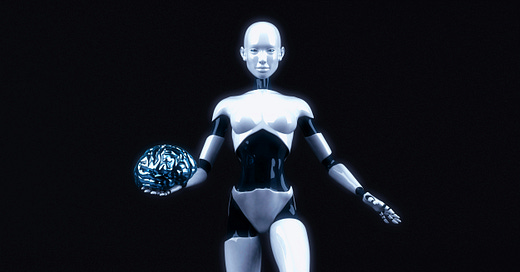The Omnipresence of AI
Artificial Intelligence (AI) dominates discussions about the future. From breakthroughs in language models and image recognition to Silicon Valley’s grand promises, AI seems poised to fundamentally reshape society. Yet, amid the excitement, many— even the well-educated— remain unaware of its risks and deeper implications. There’s also a tendency to underestimate certain possibilities, like the idea that human intelligence might, in fact, be replicable.
A Pioneer’s Fear
Douglas Hofstadter, renowned for Gödel, Escher, Bach, has deeply engaged with AI’s development and reached unsettling conclusions. At a Google conference, he expressed profound concern: “I’m terrified. Terrified.” His fear isn’t rooted in typical sci-fi tropes— not an AI becoming too smart, invasive, or world-dominating. Instead, Hofstadter fears that human intelligence— that subtle blend of reason, intuition, emotion, and consciousness— might be easier to replicate than we think.
If AI, through brute algorithms and computational power, can perfectly mimic what we consider “human thought,” our entire conception of the mind’s uniqueness and complexity could be challenged. Hofstadter described this as “terrifying, disturbing, sad,” shocked by how quickly and blindly researchers rush to build such systems without questioning the nature of humanity.
Underestimating the Real Issues
While many warn of AI risks, the most discussed dangers are often overstated or misunderstood. Fears of a “superintelligence” becoming conscious and deeming humans obsolete are common but misguided. As Melanie Mitchell notes in Artificial Intelligence: A Guide for Thinking Humans, current AI is far from achieving human-like general intelligence. It operates on fundamentally different principles from the human brain.
The subtler problem is that AI systems could become good enough to perfectly imitate human creative processes without true understanding or consciousness. For instance, an algorithm can compose music in the style of Chopin or Bach, but it doesn’t “feel” or exhibit genuine creativity. Yet, to the average listener, the difference might be imperceptible. Hofstadter was deeply disturbed by a system called EMI, which could mimic the styles of great composers. If what we consider “artistic genius” can be reduced to statistical patterns, what happens to the mystery and complexity of human consciousness?
Is Human Intelligence Irreplaceable?
Many experts argue that, despite AI’s impressive advances, replicating human intelligence remains extraordinarily difficult— perhaps impossible. Mitchell Kapor stated: “Human intelligence is a marvelous, subtle, and poorly understood phenomenon. There is no danger of duplicating it anytime soon.”
The human brain isn’t just an information processor; human thought transcends pattern recognition and optimization. It’s rooted in experience, intuition, consciousness, emotions, and complex interactions with the world. Even the most advanced AI models don’t “understand” in a human sense— they manipulate symbols and data without grasping their meaning.
In the long term, it’s unclear if AI will ever replicate what makes human intelligence special. Until then, the real challenge isn’t a superintelligence surpassing us but the risk that we begin to see ourselves as less unique than we are.
An AI-Driven World: Progress or Loss?
Google and other tech giants are heavily investing in AI, aiming to “solve intelligence and use it to solve everything else.” But a fundamental question remains: to what extent will AI enhance our lives, and to what extent will it erode our sense of humanity?
AI holds immense potential— accelerating scientific discoveries, automating mundane tasks, and tackling complex problems. Yet, in our rush to automate everything, we risk losing sight of what makes us human.
Hofstadter and others sound a warning: the danger isn’t AI becoming too intelligent but that we might lose confidence in our own. Instead of racing to replicate human thought with algorithms, perhaps we should first consider what makes the human mind unique— and why it’s worth protecting.
Closing Notes: Investing in the Age of AI
Navigating the AI revolution as an investor requires a balanced approach. As always. Things to consider:
Focus on Ethical AI Companies: Invest in firms prioritizing responsible AI development, with transparent practices and a focus on human-centric applications (e.g., healthcare, education). Companies like these are likely to gain long-term trust and regulatory support. Yes, it might be boring, but in the long run, safety first!
Diversify Across Sectors: AI is transforming industries like tech, healthcare, logistics, and finance. Diversifying investments across these sectors can be a smart approach.
Monitor Regulatory Trends: Governments are increasingly scrutinizing AI for ethical and societal impacts. Stay informed about regulations that could affect AI companies’ operations and profitability.
Your own flair and passions: what are you passionate about? find out and start investing in things that you think will make a better world tomorrow.
Do not forget the fundamentals: it may be AI, but most companies can’t escape the curse of the balance sheet. Look for fundamentals and red flags.
Thanks for reading! Subscribe for free to receive new posts and support my work.





